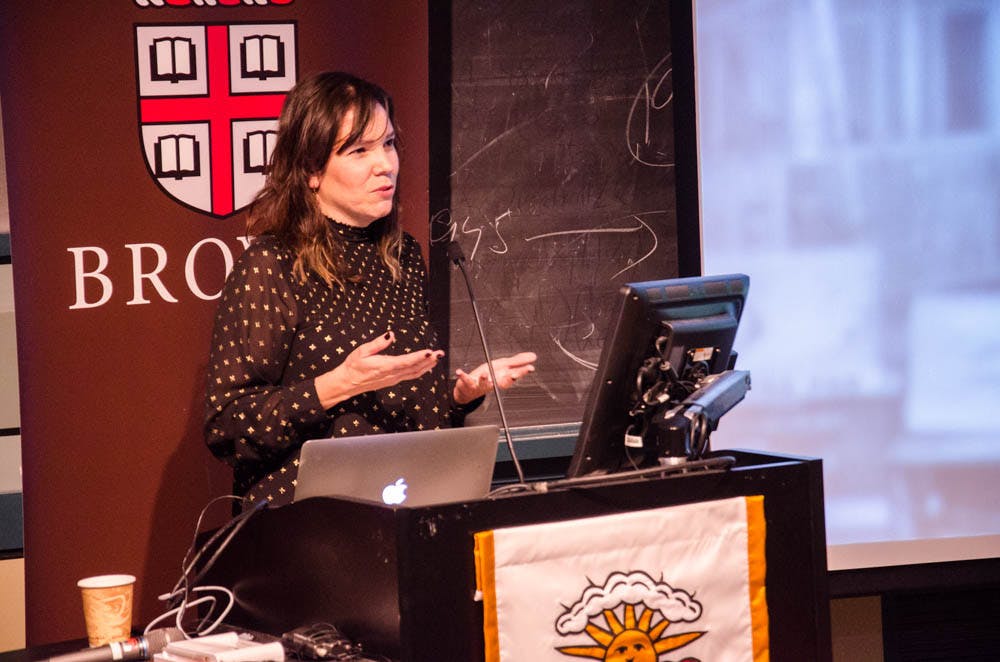Heather Fleming, founder and CEO of Catapult Design, gave a lecture Monday night that moved students in the room to take notes on their phones.
Raised in Vanderwagen, New Mexico, less than a mile from the Navajo reservation, Fleming stressed the role of engineers and designers in addressing the inequities she witnessed growing up.
Fleming is the third speaker to be featured at the Dana M. Dourdeville Lecture on Engineering in Service to Society, which was established in 2015 to feature the “profound impact science and technology can have on society,” said Dean of the School of Engineering Lawrence Larson.
“I get invited to do a lot of these things, but this one I was really excited to be a part of because its exactly the kind of mission we should all be here for,” Provost Richard Locke P’18 said in his opening remarks. “We are all working long hours to learn new things, to generate innovation, but innovation for what? What’s so important is innovation to make the world a better place.”
Fleming highlighted the correlation between dramatic population growth and poorer nations to show the necessity of engineering in global development. She pointed to entrepreneurs who helped Rwandan women stay in school with a low-cost, locally-manufactured sanitary pad as an example of a design initiative addressing humanitarian challenges.
“Engineers and designers are very powerful,” Fleming told The Herald. “These skills that you absorb don’t necessarily need to be applied to technical challenges all the time. There (are) so many different career paths for engineers and designers.”
People-oriented problem solving first attracted Fleming to engineering when her cousin created a water tank that gave running water to those without it.
“Engineers are humanitarians, that’s what I was thinking in my head,” she said of seeing her cousin’s invention. “I decided then that I wanted to be an engineer, too. So I applied to college, and I got in. I started the civil engineering track, and I quickly realized how technical engineering is.”
After graduating from Stanford, selling flowers for a year and working with remote controls and 3D TVs, it was through Engineers Without Boarders that Fleming rediscovered a link between engineering and humanitarianism.
“After a year of stumbles, we incorporated Catapult Design to continue what we learned in our day jobs as product design consultants — and our night and weekend jobs as volunteers — to try to tackle these global development challenges,” she said.
Nine years later, Catapult Design has taken on 60 design projects in 14 different countries to make design accessible to organizations working to solve global, humanitarian problems, she said.
Fleming walked audience members through Catapult Design’s partnership with Innovations for Poverty Action to improve hand washing in rural Kenya. The presentation featured video clips that showcased Fleming’s trip to Kenya, conversations to identify how people think about and use soap, meetings with stakeholders and manufacturers, prototyping and the end product — a functioning, durable hand-washing system.
With the growth of her business, Fleming was able to bring product design home to address the very inequities that jump-started her career. After staying alert on holiday visits home, Fleming noticed that there were hardly any entrepreneurs or formal businesses across the Navajo nation. With further observation, she realized that there was in fact no word in Navajo for “entrepreneur” or “business.”
“It’s not part of our cultural identity,” she said. “Even if you do exhibit entrepreneurial qualities or you are business-oriented, we may not be able to recognize it immediately or even be able to identify those qualities.”
Fleming also observed little available information surrounding how to start a business. To address the gaps in knowledge, she followed the trajectory that Catapult Design had established. After a process that included many conversations with the few entrepreneurs they could find, Fleming and her team prototyped “Build Navajo” in December 2016, she said. The website visually illustrates the process of starting a business, as detailed by successful Navajo entrepreneurs.
Nadia Goldberg ’21 said the talk has changed the way she thinks about her career.
“I thought she was really cool,” Goldberg said. “I hadn’t previously thought about engineering in the humanitarian sense.”





